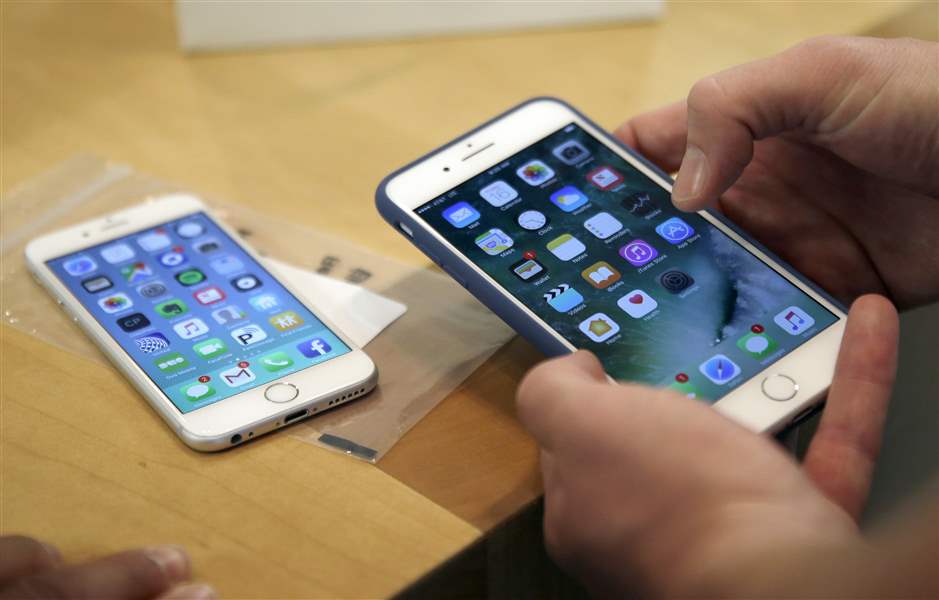
COMMENTARY: CULTURE SHOCK
Latest circle of technology drives Apple sales
'Bigger and better' spurs technology, also Wall Street
9/30/2016
A customer sets up his new iPhone 7 Plus, right, as he switches from the iPhone 6 at the Apple Store on Michigan Avenue in Chicago earlier this month.
ASSOCIATED PRESS
Apple Inc. released its latest-greatest iPhone — iPhone 7 and iPhone 7 Plus — earlier this month to long lines, plaudits, big sales, and even bigger expectations.
Bill Maher is having none of it.
In a “New Rules” rant a week ago titled “Don’t Ask, Don’t Sell” at the end of his long-running HBO roundtable discussion show Real Time With Bill Maher, the comedian/social provocateur went after Apple and its annual iPhone upgrades.
“The next time Apple wants to do something truly innovative and really think different, they should try not releasing a new phone. Because somebody has to teach Americans that we don’t always have to have something newer, better every year ...
“The only people who really need you to get a new phone every year are the shareholders.”
The latter was Maher’s ultimate point, that it’s not just technology that’s in a perpetual cycle of “bigger and better” but Wall Street as well.
Apple needs a continuous stream of consumers buying its products to not only meet but to exceed Wall Street expectations and thereby keep shareholders happy. To that end, Apple introduced its iPhone Upgrade Program last year, a monthly payment plan for consumers to spread the cost of a new iPhone over two years, and the ability to upgrade annually.
But this pattern of upgrading technology isn’t isolated to Apple. And it’s not just about profits.
As predicted decades ago, consumer electronics — TVs, computers, smart phones, tablets — are in a constant state of improvement.
In 1965, Gordon Moore, who co-founded what would become Intel, observed that transistors on computer chips were continually shrinking. The advantage to smaller transistors was that more of them could fit on a computer chip, and thus increase the chip’s power. By 1975 — the year before Apple was born — Moore adjusted his observation to reflect the rapid pace of technology: Chips would double in power every two years.
And thus Moore’s Law.
The good news is that Moore’s Law provides the rapid evolution of technology and its ability to make our lives better, easier, safer, and more enjoyable.
Consider how much the smart phone has changed in the decade since the iPhone’s debut, itself a watershed for personal technology that established the industry template for such portable devices.
The bad news is that Moore’s Law also means every year we’re left wanting for bigger and better, even if we don’t need it. (The ol’ want vs. need debate.)
Video game consoles have been the exception to Moore’s Law; on average, the next generation of gaming systems appears every six years.
That’s about to change.
After introducing the current generation of leading gaming systems in 2013 — Microsoft’s Xbox One and Sony’s PlayStation 4 — Microsoft and Sony will release mid-generation console upgrades next year. The Xbox One Scorpio and PlayStation 4 Pro will offer more memory and more gaming power, including the ability to play games at 4K, meaning resolution four times that of full HD (1080p) — and for only several hundred dollars more.
So what is driving these console upgrades: Moore’s Law? Shareholders? Microsoft and Sony? And how much are gamers — i.e. consumers — responsible as the demand needed for the supply?
As someone who’s grown quickly fond of his iPhone 7 Plus — a replacement for an iPhone 6 Plus with a blurry camera and software/memory issues — I acknowledge I’m a sucker for the latest and greatest.
Did I need a new smart phone? No.
Did I want one? Yes.
My new iPhone takes marginally better pictures, weighs slightly less, and is moderately quicker and more responsive than my two-year-old iPhone. And it only cost a few hundred dollars.
So, yeah ... who’s the sucker now?
Contact Kirk Baird at kbaird@theblade.com or 419-724-6734.